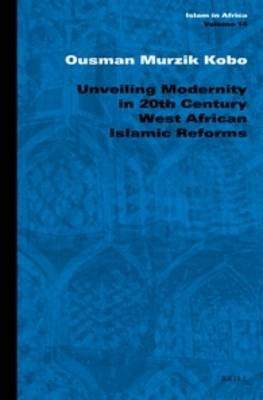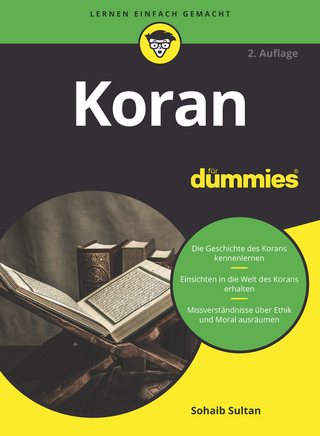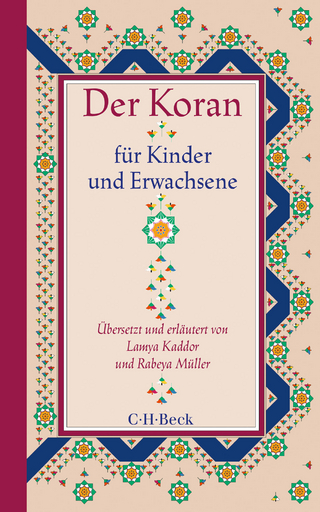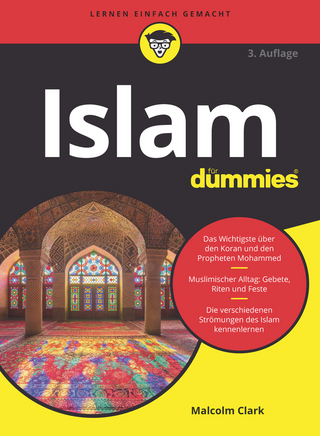
Unveiling Modernity in Twentieth-Century West African Islamic Reforms
Brill (Verlag)
978-90-04-21525-2 (ISBN)
In this book Ousman Kobo analyzes the origins of Wahhabi-inclined reform movements in two West African countries. Commonly associated with recent Middle Eastern influences, reform movements in Ghana and Burkina Faso actually began during the twilight of European colonial rule in the 1950s and developed from local doctrinal contests over Islamic orthodoxy. These early movements in turn gradually evolved in ways sympathetic to Wahhabi ideas. Kobo also illustrates the modernism of this style of Islamic reform. The decisive factor for most of the movements was the alliance of secularly educated Muslim elites with Islamic scholars to promote a self-consciously modern religiosity rooted in the Prophet Muhammad’s traditions. This book therefore provides a fresh understanding of the indigenous origins of “Wahhabism.”
Ousman Murzik Kobo, Ph.D (2005), University of Wisconsin-Madison, is Professor of History at Ohio State University. His research and teaching interests include 20th century West African social and religious history as well as the social history of West African migrants in the United States. His publications include The Development of Wahhabi Reforms in Ghana and Burkina Faso, 1960–1990: Elective Affinities between Western-Educated Muslims and Islamic Scholars (Comparative Studies in Society and History, 2009).
CONTENTS
Abbreviations ................................................................................................... xi
Preface ................................................................................................................ xiii
Acknowlegdments .......................................................................................... xxxiii
Maps ................................................................................................................. xxxviii
Introduction ..................................................................................................... 1
The Scope of the Study ..................................................................... 15
Methodology: Archives with Voices .............................................. 17
Unveiling the Discourse of Modernity in Twentieth-Century West African Reforms .............................. 21
Radicalism and Coexistence in West Africa’s Tradition of Islamic Reform and Renewal ........................... 32
Ahmad b. Abd al-Halim Ibn Taymiyya (1263–1328) ................. 34
Muhammad b. Abd al-Karim al-Maghili al-Tilimsini .............. 37
El Hajj Salim Suwari .......................................................................... 41
Uthman dan Fodio ............................................................................. 44
Hajj Umar Tall al-Futi ....................................................................... 46
PART ONE
HISTORY
Introduction to Part One .............................................................................. 52
1 Islam Prior to the Colonial Period ..................................................... 53
Islam in Burkina Faso prior to the European Conquests ....... 55
Islam in Ghana prior to European Colonialism: Compromises and Coexistence with the Asante ................. 63
2 Managing the “Islamic Menace”: Islam under British and French Rule .......................................................... 71
Mahdism and the Discourse of “Islamic Fanaticism” in Colonial West Africa ................................................................ 75
Taming Islamic Knowledge: Colonialism and the Development of the Madrasa .................................................... 85
French Policy toward Islam in Burkina Faso ............................. 88
British Colonial Attitude toward Muslims and Islamic Schooling in Ghana .......................................................... 92
Sheikh Boubacar Sawadogo and French Policies toward Muslims in Burkina Faso ......................................... 94
The Muslim Confijigurations at the End of Colonial Rule ....... 111
PART TWO
EARLY IMPLANTATION
Introduction to Part Two ............................................................................. 120
3 From the Students of the Sheikh to the Followers of the Prophet: Genesis of Wahhabism in Burkina Faso ..... 121
Early Implantation of Wahhabism: The Malian and Senegalese Influence .......................................................... 121
Communauté Musulmane de Haute Volta (Burkina Faso) ... 126
El Hajj Muhammad Malick Sana ................................................... 128
Imam Sayouba Ouédraogo .............................................................. 130
Aboubacar Kanozoe of Paghtenga ................................................ 131
Message and Influence ..................................................................... 133
The Growth: 1966–1972 ..................................................................... 139
Recruitment Strategies ...................................................................... 143
The Mosque and the Spread of Wahhabi/Sunna Doctrine ... 145
Internal Conflicts ................................................................................ 147
4 “Seeing” God: Tarbiya and the Beginning of Wahhabism in Ghana .......................................... 153
Hajj Yussif Salih Afa Ajura ............................................................... 154
Veiling the Bride: Hajj Yussif Afa Ajura’s Cultural Reform .... 156
Anti-Tarbiya and the Founding of Ambariyya .......................... 162
Smashing the Idols and Burning the Talismans: Sheikh Adam Appiedu’s Reform in Asante ...................... 171
PART THREE
MATURATION: 1970s–1990s
Introduction to Part Three ........................................................................... 184
5 Mouvement Sunnite of Burkina Faso, 1973–1988 .......................... 187
The Reconstituted Communauté Musulmane and the Conflicts of 1973 .................................................. 189
The Formation of the Mouvement Sunnite de Haute Volta (Burkina Faso) ............................................... 198
Burkina Faso and the Arab/Muslim World ................................ 201
The Sunna Movement, Phase II ..................................................... 204
6 Promoting the Good and Forbidding the Reprehensible: Wahhabism in Ghana, 1970–1998 ....................... 211
Hajj Umar’s Intellectual Development ........................................ 211
Islamic Research and Reformation Center ................................. 213
Secularly-Educated Muslim Professionals and the Difffusion of Wahhabism in Accra ............................. 216
The Ghana Islamic Research and Reformation Center I (1970–1986) ........................................................ 224
Wahhabi-Inclined Reform in Kumasi .......................................... 230
7 The Triple Heritage of West African Wahhabism: Islamic Reform and Modernity from Within and from Without ....237
The Indigenous Context ................................................................... 238
The Middle Eastern Connection .................................................... 238
The European Context: Some Elective Afffijinities between West African Wahhabism and Western Modernity .. 241
Islamic Schooling and West African Wahhabi Reform .......... 251
Patterns of the Development of Madrasas in Burkina Faso .. 254
Patterns of the Development of Madrasas in Ghana .............. 257
Madrasa Schooling and Muslim Fanaticism ......................... 271
PART FOUR
A NEW PHASE OF WAHHABISM, 1990 TO PRESENT
Introduction to Part Four ............................................................................. 282
8 From Rejection to Coexistence ........................................................... 283
The Search for Coexistence and the Dissolution of the Mouvement Sunnite (1988–1998) ......................... 285
The Search for Coexistence and the Decline of Wahhabism in Ghana ............................................................ 289
Indigenizing Wahhabi-Inclined Reform in Ghana ................... 297
The Takfijir Debate ............................................................................... 299
9 “Conscripts” of Modernity and Wahhabi Reform .......................... 311
References ......................................................................................................... 339
Appendix ........................................................................................................... 357
Indexes ............................................................................................................... 361
| Erscheint lt. Verlag | 14.12.2023 |
|---|---|
| Reihe/Serie | Islam in Africa ; 14 |
| Verlagsort | Leiden |
| Sprache | englisch |
| Maße | 155 x 235 mm |
| Gewicht | 831 g |
| Themenwelt | Geisteswissenschaften ► Religion / Theologie ► Islam |
| ISBN-10 | 90-04-21525-5 / 9004215255 |
| ISBN-13 | 978-90-04-21525-2 / 9789004215252 |
| Zustand | Neuware |
| Haben Sie eine Frage zum Produkt? |
aus dem Bereich


